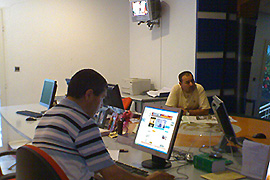Al Jazeera trial to open in Rabat
Trial of Al Jazeera bureau chief set to begin in Moroccan capital.

Moroccan authorities have rejected as “false” and “absurd” reports of deaths in the Sidi Ifni protest, saying that 48 people were injured, including 28 police officers, but that no deaths occurred.
Though Al Jazeera reported the government’s denial, the Rabat chief prosecutor’s office ordered a probe to determine how the false information was disseminated.
Rachidi was interrogated by the judiciary police for four hours and was charged on June 14 with publishing false information and conspiracy.
The Moroccan communication ministry then withdrew his media accreditation in the country.
 |
| Al Jazeera’s daily news bulletin from Rabat was suspended in May |
Rachidi is facing prosecution under Article 42 of the country’s press code.
“The press code requires that two conditions be satisfied in order to convict someone for publishing false information under Article 42,” Khalid Soufiani, defence team leader, explained to Al Jazeera.
“The first condition is the publication of false information with the intention of bad faith and, second, that that publication disturbs the public order,” Soufiani said.
The defence team leader said that the prosecution has to prove that Rachidi acted in bad faith by publishing a story knowing that it was false.
Rachidi will plead not guilty to the charges.
Strained relations
In May, Morocco suspended Al Jazeera’s daily news bulletin covering the Maghreb countries (Morocco, Algeria, Tunisia, Libya and Mauritania) from its studios in the Moroccan capital.
The action was condemned by the International Federation of Journalists (IFJ), describing it as “inexplicable”.
“We need to have a clear explanation about why Al Jazeera is suspended. If there is no convincing reason then this will be seen as a political act of interference in media. That is unacceptable and intolerable for journalism in Morocco and for media throughout the region.” said Younes M’jahed, IFJ vice president and president of the national syndicate of Moroccan press (SNPM).
The decision according to Khalid Naciri, the Moroccan communication minister and official spokesman of the government, was due to technical and legal issues.
“There’s no room for giving this decision a political dimension,” Naciri was quoted as saying at a news conference in early May.